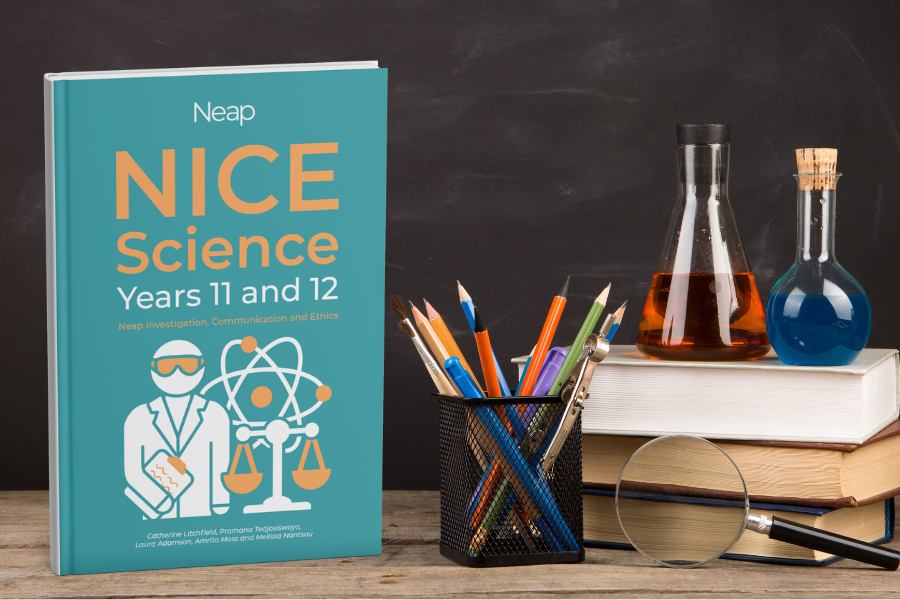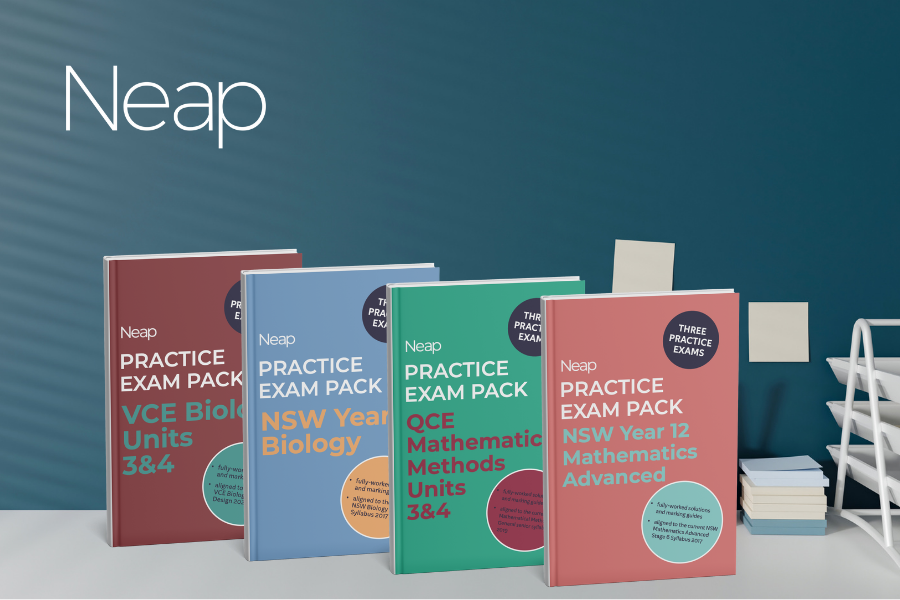Across Australia, curriculums and syllabuses are placing greater emphasis on science inquiry and science as a human endeavour. So, we know that it's essential for teachers to have access to resources that will enable them to explore investigation design, communication and ethics in science with their students in depth.
That's why we're bringing you Neap Investigation, Communication and Ethics in Science – or NICE Science!
We sat down with lead authors Catherine Litchfield and Pramana Tedjosiswoyo to talk about how NICE Science: Years 11 and 12 facilitates effective teaching of scientific investigation, communication and ethics concepts in science classrooms.
How has the emphasis on scientific investigation, communication and ethics concepts changed in recent science syllabuses across Australia?
PT: Over recent years, there has been increased emphasis on practical science skills and the communication of scientific ideas, both in terms of the depth to which students need to engage with the data they collect from experiments and how they articulate their understanding of abstract ideas or research into contemporary issues.
CL: Recent senior science syllabuses have continued emphasising the skills of working scientifically as an umbrella over content areas. We have also seen a greater focus in Year 7–10 curriculums and syllabuses on teaching students to understand the scientific process, evaluate texts and appreciate the ethics involved in scientific research. For example, the new Data Science units in the NSW syllabus require more detailed interpretation and analysis of data in its various forms, and an exploration of pseudoscience.
PT: This emphasis across disciplines has been reflected in examinations and in classroom learning and assessment activities. We've seen the introduction of practical and research-based investigations, as well as more detailed studies that delve into scientific communication. These require students to focus on developing skills related to the interpretation of communicated information and the analysis of quantitative data from different perspectives to make more specific evaluations of the quality of findings.
The specificity of syllabuses has also been enhanced over recent years. They now require students to examine ethical and evaluative concepts in greater depth when they analyse findings from investigations. This can be seen in the more discerning terminology used in student learning outcomes, which asks students to differentiate between closely related ideas that were previously grouped together. For example, students now learn to differentiate between repeatability and reproducibility instead of just referring to reliability.
How has this emphasis changed how teachers should engage students when teaching scientific investigation, communication and ethics concepts?
PT: The emphasis on the analytical and evaluative skills that students need to apply to a broad range of investigations has necessitated the exploration of pedagogical approaches to skill development that may not have had an explicit focus in previous iterations.
Science educators bring a wealth of knowledge and experience – drawn from their studies and vocations in their specific fields of expertise – to the classroom. However, with this breadth comes variations in the way in which key terms such as validity and accuracy are interpreted. To ensure that students can develop a clear and confident understanding of these types of concepts, teachers need to more thoroughly engage their students with the metacognitive discourse that occurs internally or implicitly when evaluating investigations.
When planning sequences of learning and embedding the development of key skills, teachers now need to consider how activities that support student understanding of subject-specific concepts can be further enhanced to explicitly focus on the development of ICE skills. To do this, teachers should carefully consider how continua of learning can be observed in relation to ICE concepts, and build their repertoire of real-world examples that rigorously illustrate these concepts in a relatable way. For example, to engage students in identifying key features of an investigation – and ultimately designing, implementing and evaluating their own self-directed investigations – teachers can focus on data literacy and source analysis, and explore a wide range of data sets, articles and methodologies.
CL: It has never been more important that science educators empower students with the skills and tools required to build their scientific literacy as this will enable them to discern science from pseudoscience and misinformation.
How does NICE Science: Years 11 and 12 support in-depth exploration of scientific investigation, communication and ethics concepts for different disciplines?
PT: NICE Science: Years 11 and 12 has brought together educators from across a broad range of science disciplines to discuss and agree on the most efficient, accurate and rigorous ways to define and explain ICE concepts.
CL: The book can be used easily to teach scientific investigation, communication and ethics concepts with consistency across disciplines. The clear explanations, examples, questions, solutions and tips for students are particularly useful for helping teachers and students to apply working scientifically skills.
PT: We've ensured succinct explanations of concepts at a student level that are supported by real-world scientific examples, many of which students would be able to relate to from their previous science studies. Examples are annotated and explained so that the thinking processes associated with how ICE concepts are applied are clearly articulated to support the development of heuristic thinking.
What can teachers expect from NICE Science: Years 11 and 12?
CL: NICE Science: Years 11 and 12 is a user-friendly reference to support science educators and, in turn, their students. It will support the embedding of scientific literacy in our senior student population and also provide teachers with the skills to explicitly teach scientific investigation, communication and ethics skills to science students from all year levels.
PT: Teachers can expect to engage with a resource that is suitable for both students and teachers. It is a tool that can be used during the teaching and learning cycle or to support the regular revision of concepts throughout the school year. In addition to a clear framework for the articulation of ICE concepts, NICE Science: Years 11 and 12 provides a starting point for the discussion and development of scientific ideas and investigations.
How can teachers incorporate NICE Science: Years 11 and 12 into their classroom?
PT: The versatility of the content in NICE Science: Years 11 and 12 means that it can be incorporated into many aspects of the teaching and learning cycle.
CL: The book has been designed so that teachers can ‘dip in and out’ as needed.
PT: For example, teachers can use the definitions and explanations of concepts to guide students in developing their initial understanding, they can also use the examples as talking points to encourage students to start thinking about and applying their understanding of ICE concepts.
CL: Development of metacognitive skills is important. Each concept covered in the book has tips for students, which can be used to pose questions and improve critical thinking skills and ensure that students are doing the thinking and higher-order processing. Also, the annotated questions and answers provide visible thinking tools to boost scientific thinking and understanding.
PT: These exam-style questions can be used at the commencement of revision to measure the accuracy and depth of student understanding, while the tips for students can assist in forming the basis for revision summaries.
CL: Overall, the different elements of NICE Science: Years 11 and 12 can be used by teachers to assist students when they design and conduct investigations, consider ethical frameworks and evaluate secondary information.
A unique, easy-to-use resource for teachers of Year 11 and 12 science subjects
NICE Science: Years 11 and 12 has been authored and reviewed by a dedicated team of teachers from across Australia. It is designed to be used in Year 11 and 12 science classrooms across Australia and is suitable for teachers of:
-
Biology
-
Chemistry
-
Environmental Science
-
Investigating Science
-
Physics
-
Psychology.
This book offers comprehensive coverage of key scientific investigation, communication and ethics concepts, including:
-
accessible definitions and summaries
-
annotated examples
-
annotated questions and solutions
-
tips for working with students.
Want to learn more about NICE Science: Years 11 and 12? Reach out to our team or explore our website for more information.


